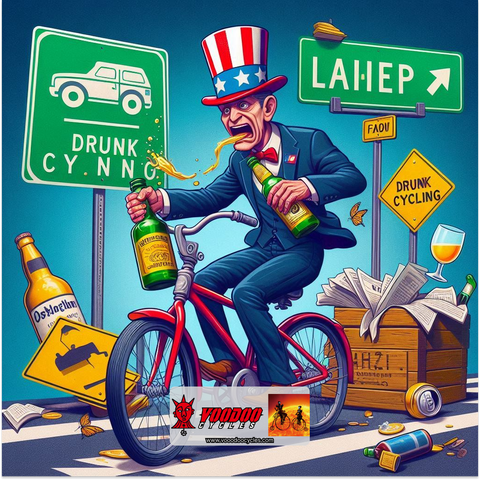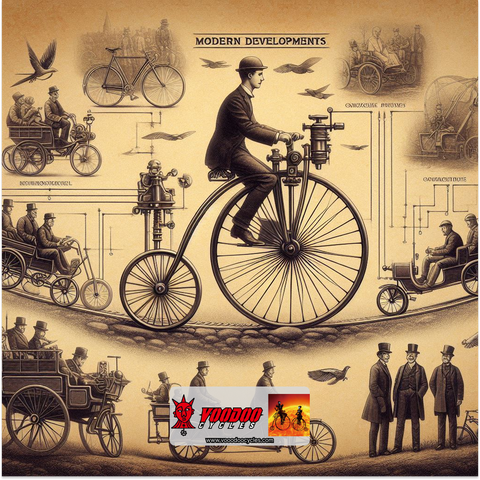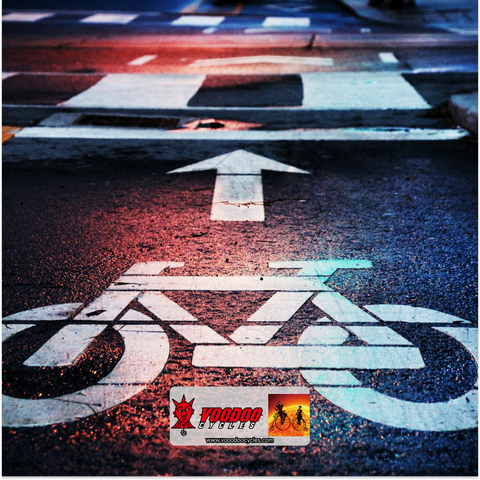
Is it illegal to ride a bike after drinking alcohol?
Can you get a DUI on a bicycle?
喝酒可以騎腳踏車嗎?
自転車 酒気 帯び 罰金?
These are common inquires from all over the world.
Cycling under the influence (CUI) has become a growing concern globally, so much so that this topic has been trending across Google search worldwide. As bicycle popularity surges, so do instances of cyclists operating their vehicles while impaired. This article delves into the complexities of CUI laws across various regions, including North America, Europe, Asia, and Oceania. We'll examine how different jurisdictions define "vehicles", blood alcohol content (BAC) limit levels, and enforce penalties for CUI offences.
North America
United States
When it comes to the laws for cycling under influence (CUI) or driving under influence (DUI) on a bicycle in the United States, they vary widely. The laws vary across states due to how each of their motor laws defines "vehicles." For example, in Texas, bicycles are identified as vehicles; therefore, cyclists can be charged similarly if found operating while impaired. On the other side of the country, under California Vehicle Code VC Section 21200.5, riding a bicycle under the influence is a misdemeanour charge with a fine of up to $250 and no jail time. In some states, like New York, Alaska, or Arizona, there are no specific laws governing against CUI; however, cyclists can still face charges for public intoxication or endangerment. Please refer to the list below to see each state and their CUI laws.
Canada
In Canada, the criminal law system is generally governed by the Canadian Criminal Code, a federal statute that usually applies equally across all provinces and territories. This legal framework is similar to that of the United States, where the federal law governs the country as a whole; however, at the state/provincial level, variations can take place that influence how laws are administered and enforced. Under the Canadian Criminal Code, traditional bicycles are not classified as "conveyances." Therefore, cyclists cannot be charged with DUI while riding a traditional bicycle when impaired by alcohol or drugs. However, electric bikes (e-bikes) are a different story as they come with a motor, making them a “motorised vehicle.”. Below is a list of variations by province.
Alberta: Cyclists can face charges related to CUI; bicycles are considered vehicles under its Traffic Safety Act.
British Columbia: Traditional bicycles are not subject to DUI laws. However, if the cyclists’ behaviour endangers themselves or others, they can be charged with public intoxication or careless driving.
Nova Scotia: Has laws applicable to CUI.
Ontario: Cyclists can only be charged when the bicycle is motorised. Identical to British Columbia, if the cyclists’ behaviour endangers themselves or others, they can be charged with public intoxication or careless driving.
Quebec: Same as Ontario, primarily applying to motorised bicycles, cyclists can face penalties if their blood alcohol content (BAC) exceeds legal limits.
Europe
United Kingdom
The Road Traffic Act 1988 is the legal framework that governs cycling under the influence and driving under the influence in the United Kingdom. Under the law, it is illegal to cycle when unfit because of alcohol or drugs. Cyclists can be charged if they are unable to control their bike due to intoxication. Unlike drivers, there's no specific blood alcohol limit for cyclists. It is important to note that the laws governing cyclists and those governing motor vehicle operators are independent. Whether the vehicle is motorised or not plays a big factor in the United Kingdom. If the impaired individual is operating a motorised vehicle, then the individual will be charged with driving under the influence. However, if the vehicle is not motorised (like most bicycles), then the individual will be charged with cycling under the influence. The police have the authority to stop any cyclists to assess their ability to control their bike safely if suspected of over-intoxication. They can also request a breathalyser test, but it is optional for cyclists. Similar to careless cycling, the fine can be up to £1,000 for cycling under the influence; the amount is increased to £2,500 if the event leads to dangerous riding. In reality, how strictly these laws are enforced varies. Police usually don't stop cyclists unless they're explicitly dangering themselves or others. Many cyclists can ride home after drinking without ever getting caught unless they cause an accident or behave erratically.
European Union
European countries have varying regulations regarding cycling under the influence of alcohol. While some countries have relaxed rules with specific blood alcohol content (BAC) limits, others maintain strict prohibitions. Some countries with relaxed limits and rules include Slovakia, Austria, and Germany. Germany currently has the BAC limit for cycling set at 1.6 g/kg, or 0.16% BAC. To put it into perspective, in the United States, the legal BAC limit for driving is 0.08%. Countries with more strict rules and regulations include France, Spain, Italy, and the Netherlands. In Spain, cycling under the influence is illegal, with the BAC limit varying across regions and the fine being €500 to €1,000 (depending on the severity of the offence). Below is a short list of some European countries and their legal status for cycling under influence.
Asia
Taiwan
In Taiwan, cycling under the influence has become a notable legal issue over the last decade. In July 2019, authorities tightened the regulations. As of July 1, 2019, Taiwan introduced laws that target cyclists on bicycles, electric bikes (e-bikes), and tricycles. This marks the first explicit official mention of bicycles under Taiwan’s drunk driving laws. When caught, cyclists can face fines ranging from NT$600 to NT$1,200 (approximately US$20-US$40). When stopped by the police, the cyclist can also refuse the breathalyser test with a one-time fine of NT$2,500 (around US$80). Same as the U.K., Taiwan’s laws place significance on the classification of vehicles with and without motors. Electric scooters, electric bikes, and hoverboards are considered “electric motor-powered vehicles” under Taiwanese law and will face harsher penalties if caught operating them under the influence.
在臺灣,近十年來,酒後騎自行車已成為一個顯著的法律議題。2019年7月,當局加強了相關規定。自2019年7月1日起,臺灣實施了針對自行車、電動自行車和三輪車騎乘者的法律。這是臺灣酒駕法首次明確提及自行車。若被抓到,騎乘者可能面臨新臺幣600元至1,200元(約合美金20至40元)的罰款。被警方攔查時,騎乘者也可以拒絕酒測,但需繳納一次性罰款新臺幣2,500元(約合美金80元)。與英國一樣,臺灣的法律重視有動力和無動力車輛的分類。電動摩托車、電動自行車和懸浮滑板在臺灣法律中被視為「電動機車」,若酒後駕駛這些車輛,將面臨更嚴厲的處罰。
The above translation is provided by Google Gemini.
Japan
Similar to Taiwan, cycling under the influence has also become a serious legal issue in the past decade. On November 1, 2024, a revised version of the Road Traffic Act was implemented. In this revised version, cyclists found with more than 0.15 mg of alcohol per litre of breath will face fines of up to 500,000 yen (approximately US$3,270) and up to three years imprisonment. This comprehensive revision also includes regulations addressing “distracted driving” (using a phone while riding); cyclists charged with distracted cycling will face a fine of up to 100,000 yen (approximately US$654) and/or up to six months imprisonment. Some big challenges that come with the revision and implementation of new laws and regulations are the lack of enforcement and public awareness. The Japanese authorities are currently actively educating the public on these new regulations and are committed to their enforcement on offenders. The National Police Agency of Japan has reported almost 50,000 bicycle-related accidents this year that led to death or injuries by September (126 of them were from “distracted cyclists”).
ここ数年、台湾と同様に、酒気帯び自転車運転も深刻な法的問題となっています。2024年11月1日、道路交通法が改正され、施行されました。改正法では、呼気中のアルコール濃度が0.15mg/Lを超える自転車運転者は、最大50万円(約3,270米ドル)の罰金と最大3年の懲役刑に処されます。この包括的な改正には、「ながら運転」(自転車運転中の携帯電話の使用)に対処する規制も含まれており、ながら運転の罪に問われた自転車運転者は、最大10万円(約654米ドル)の罰金および/または最大6ヶ月の懲役刑に処されます。新しい法律や規制の改正と実施に伴う大きな課題のいくつかは、執行力と公衆の意識の欠如です。日本の当局は現在、これらの新しい規制について積極的に国民に教育しており、違反者に対する執行に努めています。日本の警察庁は、今年9月までに、自転車に関連する事故が約5万件発生し、死亡または負傷者が出たと報告しています(そのうち126件は「ながら運転」によるものです)。
The above translation is provided by Google Gemini.
Oceania
Australia
Similar to Canada and the United States, cycling under the influence is regulated differently across states and territories in Australia. Some states impose harsh penalties comparable to those for motor vehicle offences, and others have a more relaxed approach. While there are laws in place across Australia for CUI, effective enforcement is still a challenge today. In most states, the police do not have the authority to carry out a breathalyser test unless the cyclist is implicated in an accident that resulted in hospitalisation. Refer to the below table for a more detailed summary of the legal status and penalties across different states.
New Zealand
To promote road safety in New Zealand, laws and regulations are in place for cycling under the influence of alcohol. In New Zealand, under the Land Transport Act, bicycles are classified as vehicles; this means that cyclists are subject to the same road rules as other motor vehicle operators. Although there’s no precise limit for legal blood alchol concentration levels, if cyclists are deemed incapable of controlling their vehicles in a safe manner due to intoxication, the penalties faced will be similar to those of motor vehicles. CUI-related accidents and/or dangerous riding will land the cyclist with the fine of up to NZD$1,000 or up to three months of imprisonment.
Conclusion
As the popularity of cycling continues to soar, it's imperative to address the issue of cycling under the influence (CUI). While laws and regulations vary across different regions, the underlying message remains consistent: impaired cycling is dangerous and can have severe consequences. By understanding the legal framework and potential penalties associated with CUI, cyclists can make informed decisions and prioritise road safety. As individuals and communities, we must work together to promote responsible cycling practices and reduce the number of accidents caused by impaired riders. Let’s cycle to Mars together!






